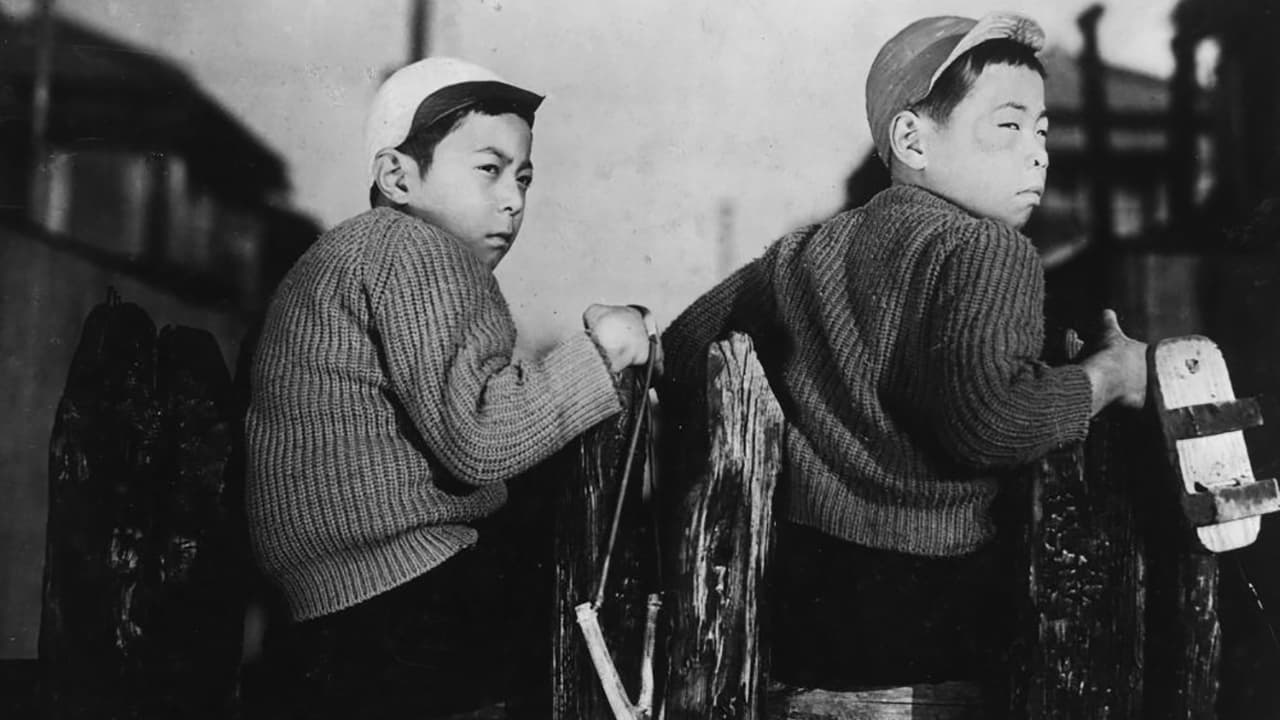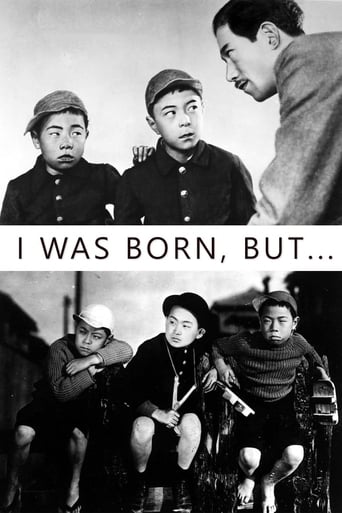



Self-important, over-dramatic, uninspired.
Good concept, poorly executed.
This movie feels like it was made purely to piss off people who want good shows
View MoreThe movie really just wants to entertain people.
Ozu's silent films are interesting because they are so much more western in tone than his ever-so-Japanese sound films. The young director of silent films was much more playful than the filmmaker he became. Indeed, I can see the young Ozu hanging out on the street with a young Truffaut talking film and chasing girls. In what would come to be known as a very French-New-Wave kind of way, young Ozu was extremely meta-cinematic, constantly examining the role of his chosen medium in society and wearing his (surprisingly Hollywood-centric) influences on his sleeve. Much of this particular film is a cute-kid comedy, no more, no less. But it has one remarkable scene in which business men screen movies they've playfully, and not always respectfully, made of each other. The illusion of cinema is, for young Ozu, the revealer of reality, rather than its mystifier.
View MoreI viewed 'I Was Born, But...' (one of the outstanding titles of all time by the way) later the same day/the evening I watched Good Morning for the first time. I'm not sure if my reaction would have varied considerably if I had seen one or the other far apart, or seen this first, but I found I liked I Was Born, But even more than Good Morning. Again, this is not to say there is a tremendous quality disparity between the two works, far from it, and you can tell the same man made both films. But I think there's more depth of feeling and less of that loose focus that, while charming, is what makes Good Morning what it is.You can tell in I Was Born, But... seeing it after the later version what was taken from where, yet at the same time it's not a remake exactly. They're cut from the same cloth, but Ozu's silent movie - not so much a comedy as it is a dramedy, of sorts - is focused much more on the children, and it's to the movie's benefit, and, naturally, the '32 film didn't (or simply couldn't) have the focus on new technology and sophisticated observations on communication. There's also the benefit of simplicity in its narrow way: we're following two brothers as they are moved to a new village by their father (played by a wonderfully laconic but tough when he needs to be Tatsuo Saito), and they have to deal with things a lot of kids have to deal with, which are fitting in to the new school, and... facing down bullies, and trying to see if they even want to go to school (late to class? eh, let's skip the whole day and eat our lunch somewhere, and get someone to forge our 'E' for Excellent grade), and then, eventually, becoming part of the group of kids after bonding over, what else, their fathers and, more specifically, who's the "best." Ozu's film is a satire (as, also, Good Morning was), but it's more dramatic than you might expect; years ago I thought this was like an early trifle, something that had kids and was cute and got a re-release at the art-house IFC theater because of the Ozu name and didn't bother to see it. I wish I had: this is full of depth of character, but it's different than what one gets in his other films (for one thing, unlike in Good Morning, to get specific, the father *does* give one of the brothers a spanking after he's run his mouth too long and cruelly, as, well, kids sometimes do). It's clear Ozu was still finding his voice, and maybe some parts of his style from his 50's and 60's work can be seen here, but what's thrilling for me is to come to this after seeing some of those acclaimed dramas and to see a film that has a lightness of spirit while being about serious things: boys and their image of their fathers, the physicality of being a boy (the brothers never fight each other, but how they move and bounce and do things with their hands is splendid), and masculinity and one's place in a society.At first I thought the whole movie would mostly be the boys, their this-and-that with the bullies who soon become friends with them as they bond over doing silly stuff (i.e. one of them pretends to be dead... not exactly the fart humor of Good Morning, but whatever, it works). But about halfway through the movie, there's a sequence I don't think I'll forget any time soon, where the father is with his boss at the company and some of the other employees (some may be fathers of the other kids, some not), and they're watching, after some other oddities like zebras, home-movies from at their job, doing silly things like making faces. The brothers' father does this, and suddenly things aren't amusing anymore. The father laughs with them, good naturedly, and it seems like the other kids are laughing who are there... and that makes it worse. The boys have questions for their father: why did he do that? Why is he a "nobody" at what he does despite what he tells his sons to do, which is to go to school to "Be Somebody"? Why isn't he the boss? The father tries to answer the best way he can, which is not good enough, and this leads to a tantrum from the boys, then the spanking, and then the remorse on both sides into the night.What was before in the first half a highly enjoyable film with little pockets of depth in the observations on how boys act with one another and becoming "part" of a group, turns into something that is about class and consciousness and becoming aware of what one really does in life - it's not a coming of age story exactly, but there is that element that, by the end, the kids have grown up a little and realized not everything is as they were taught before (which they kind of guessed, but they have it confirmed by their father who, by the way, seems unlike characters I see in Ozu films usually, which I loved). It's a story that finds creative and clever ways to go about its telling of these boys coming into their own in the world they're plopped in, which is a lower-middle class (if that's what it was, it was still the depression actually even in Japan), and how they have to navigate themselves, their father, the classmates, the school, everything.
View MoreI rate this movie as being only a step above an Our Gang comedy. It's a 1932 silent with scene after scene of kids going to school, kids coming home from school, kids eating lunch, kids eating at home, kids fighting or poking each other, kids staring at each other ready to fight. These scenes alternate with scenes of the father going to work, coming home from work, changing clothes, going into his boss's office, and all characters putting on their shoes as they come out of their house.The movie has a serious plot, with plenty of heart, but it is just too boring to have to watch all these non-scenes to get at the plot. I think the material could have been made into a pretty good short, but there's just not enough there for ninety minutes.
View MoreOne of the very few silent films where you can hear the magic. Ozu directs I WAS BORN....BUT, the story of 2 brothers growing up in a small town Japan. Beautifully filmed with a wonderful, down to earth story of childhood joys and sorrows. Keep in mind, although sad, this was filmed in 1932. Just about every child in this film would grow up and fight (and most likely die) in World War 2. With this in mind, the film with hope and innocence. Still, knowing the possible future, you can't help but see the ending as somewhat sad.
View More